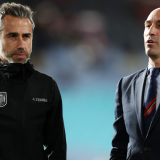
England head coach Sarina Wiegman and Spain player Aitana Bonmati won UEFA awards for coach of the year and women's player, respectively, on Thursday and dedicated their wins to Spain's Women's World Cup winning team that is currently in protest against their federation.
Wiegman accepted her award after losing in the final to Spain and used the opportunity to say "this team deserves to be celebrated and deserves to be listened to."

Golazo Starting XI Newsletter
Get your Soccer Fix from Around the Globe
Your ultimate guide to the Beautiful Game as our experts take you beyond the pitch and around the globe with news that matters.
Thanks for signing up!
Keep an eye on your inbox.
Sorry!
There was an error processing your subscription.
"We all know the issues around the Spanish team and it really hurts me as a coach, as a mother of two daughters, as a wife and as a human being. It shows … the game has grown so much, but there's also still a long way to go in women's football and in society and I would like to dedicate this award to the Spanish team, the team that played [at] the World Cup such great football that everyone enjoyed."
"This team (Spain) deserves to be celebrated, deserves to be listened to." 👏
— Attacking Third (@AttackingThird) August 31, 2023
Sarina Wiegman praises the Spanish Women's National Team and delivers a message of solidarity. ❤️ pic.twitter.com/0ebxR7cyXh
Bonmati, a member of the Spanish team that won the World Cup this month, won the award for the first time and addressed the conflict for the first time since the protest began on Friday. She announced her support of teammate Jennifer Hermoso, who was forcibly kissed by Royal Spanish Football Federation president Luis Rubiales during the trophy ceremony and backed women who are also experiencing inappropriate workplace conduct.
"As a society, we must not allow abuses of power or lack of respect to occur in a working relationship," she said in her acceptance speech for the UEFA award. "To all the women who are experiencing the same as Jenni, we stand with you."
The Spain team began their protest after Rubiales refused to resign on Friday at an emergency meeting convened by the federation where he was expected to step down. The 23 players at the World Cup, alongside more than 50 additional Spanish women's players, signed a letter that read in part that they "will not go back to the national team under the current leaders."
The signatories include the 15 players who protested the federation a year ago, a group that included Bonmati. The players sent individual but identical emails saying they would not play for the national team because the leadership created a toxic workplace that lacked professionalism. They said the federation did not adequately fund or prepare the team for matches, while the coaching staff denied players privacy during training camps. Three of the 15 eventually played for the team during the World Cup, but re-launched their protest in the wake of Rubiales' defiance.





















